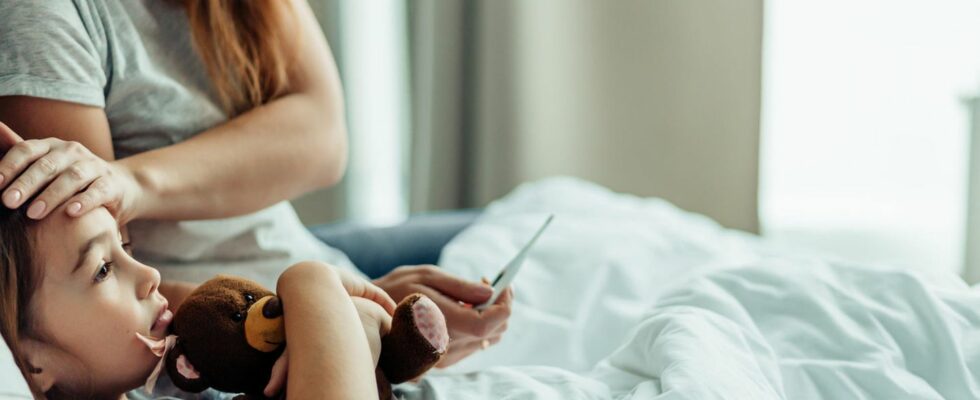Tips from a pediatrician
5 helpful routines when your children are sick
© alfa27 / Adobe Stock
What to do if you have a fever, cough, etc.? A pediatrician and mother reveals her tricks for dealing with sick children at home.
Anyone who is at home with sick children or grandchildren can quickly lose their head. Should you go to the doctor – or should you let your child rest first? Which medicine helps and what do you have to pay attention to? Over time, we become more and more familiar with such questions – but as a pediatrician you can rely on even more practice.
A doctor reveals her tricks when the kids are sick at home
The pediatrician and mother explains on “CNBC Make it”. Kelly Fradin on how she handles nursing care at home. What helps her and what she would rather do without? We’ll tell you.
Tip 1: Let feverish children sleep
The child is sleeping, but is it time for the next medicine? Let it go to sleep, says the pediatrician! “Sleep is important for healing, recovery and growth, and it can be difficult to get if your child has a cough or congestion that keeps them awake,” writes pediatrician Fradin. Parents often worry that medication is more important than sleep. Her advice: If it looks like the child feels comfortable or is resting while sleeping, the option of letting it go to sleep is usually the better one. The Federal Center for Health Education also writes on its website that rest and sleep promote children’s recovery.
Tip 2: Appearance before temperature
An elevated temperature is not necessarily a reason to take the child to the doctor’s office. Fradin recommends paying attention to the child’s appearance first. If the child appears weak and exhausted, they are more likely to need to go to the practice than if the child has an elevated temperature but is running around the house in a state of excitement. Maybe some peace and quiet is in order here by cuddling up in bed together and reading something. However, behavior in the event of a fever also depends on the age of the child and the temperature measured.
Tip 3: If the child looks worse, there are fever medications
If the child looks strained, is breathing faster or cannot sleep, is sweating heavily or is unable to drink, the pediatrician recommends fever medication. Of course, in the correct amount and in consultation with the specialist. Especially with children it is important to adhere to the correct dosage. According to the Federal Institute for Drugs and Medical Devices, children and newborns are particularly at risk of medication errors (as of 2022). Reasons may include miscommunication between parents. It should be clear exactly when the child has already received medication and from whom so that it cannot be taken twice. If a child’s symptoms persist for several days, Fradin recommends consulting a specialist.
Tip 4: No medication in teaspoons
The pediatrician explains that medication errors are more common with liquid medicine. Because not all teaspoons are the same size. In some cases, tablespoon and teaspoon units are confused. “To be on the safe side, I always give the dosage in milliliters to increase accuracy and avoid errors,” says Fradin.
Tip 5: Honey for coughs
Honey is considered a good remedy for scratchy necks. And the pediatrician also advises trying home remedies first. Cough syrups often contain many different ingredients, some of which are not necessary at all. For children over the age of one, she always used honey or cough syrups whose main ingredient was honey. So: It’s better to try it naturally first. However, parents should definitely pay attention to the age limit. “Honey, maple syrup or corn syrup can contain bacteria that can be life-threatening, especially for infants,” says the Federal Association of Pediatricians and Adolescents. According to “Öko-Test”, possible spores can no longer harm the children’s intestinal flora later.
Sources used: oekotest.de, kinderaerzte-im-netz.de, cnbc.com, kindergesundheit-info.de
